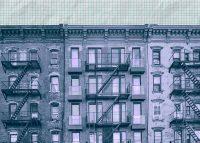As the mayor calls for a rent freeze, a Rent Guidelines Board report Thursday estimated that rent increases for rent-stabilized apartments should fall between 2.5 percent and 3.5 percent for one-year leases and 3.3 percent to 6.75 percent for two-year leases.
The board, in its first virtual meeting, discussed the report compiled by its staff that recommends rent increases using five different “commensurate” formulas that consider operating costs, revenues and inflation.
The formulas are designed to preserve net operating income for landlords of rent-stabilized buildings, which edged down by 0.6 percent from 2017 to 2018 to $535 monthly per apartment, the first drop since 2003, according to a previous report.
The formulas’ estimates are considered a starting point.
“You are not required by law to pick one of these formulas and go with it,” said the board’s executive director, Andrew McLaughlin.
Read more


One of the board’s tenant representatives, Leah Goodridge, an attorney for the Housing Project at advocacy group Mobilization for Justice, noted that preserving landlords’ net operating income isn’t part of the board members’ mandate.
Joseph Strasburg, president of the landlord group Rent Stabilization Association, which supports rent increases, disagreed. He said the board is supposed to provide relief from rent-stabilization restrictions.
“Why do you even need the RGB?” he said during an interview. “The fact is that it’s not following its mission.”
Thursday’s report, which reflects data from April 2019 to March 2020, found that the price index of operating costs for stabilized apartments in the city increased by 3.7 percent. The report projected it will jump by 2.4 percent between now and March 2021.
The meeting kicked off with the tenant representatives questioning the decision to hold the board’s meetings virtually, rather than canceling its proceedings. They and tenant advocacy groups had called for a rent freeze and suspension of the board, believing tenants would be at a disadvantage if they cannot make their case to the board in person.
Mayor Bill de Blasio had initially called for the same move, but later indicated that the state wouldn’t agree to cancel the hearings. He instead called on the board to freeze rents. The board’s decision will apply to rent-stabilized leases that come up for renewal beginning in October.
“I’ve heard over and over again it seems tone deaf and insensitive for us to move forward as a board,” Goodridge said.
In March, as social-distancing mandates began, landlord groups asked for the board’s meetings to be postponed. They have condemned the mayor’s calls for a rent freeze as an attempt to influence the ostensibly independent board before its proceedings even began. All nine board members were appointed by de Blasio.
The latest fight over the board’s actions highlights long-standing criticism of how it functions, which is further complicated by the coronavirus crisis. The city has nearly 1 million rent-stabilized apartments.
The board’s chairman, David Reiss, said that convening is the “one fundamental responsibility that this board has.” He said there could be unintended consequences if the board did not meet. Though he didn’t lay out what those consequences might be, board members indicated that it is unclear who would decide rent increases on stabilized apartments this year — the mayor or governor, for instance — if the board failed to meet.
Public member Christian Gonzalez-Rivera noted that meeting virtually may be the most transparent option available for determining rent increases. “If this is as public as it is going to get,” he said, “that means we have even more responsibility.”
Write to Kathryn Brenzel at kathryn@therealdeal.com
